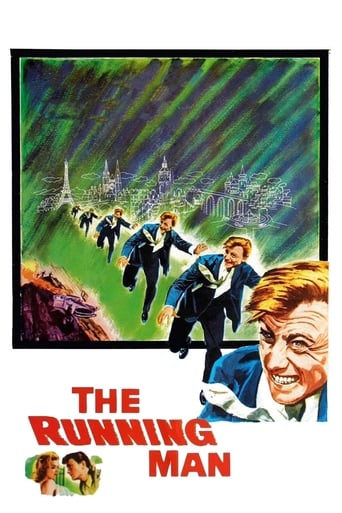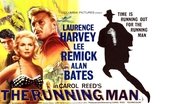Ian Brown
Watchable but somehow unmemorable suspense thriller from a major British director. The plot, cleverly written by John Mortimer, has some quite subtle twists and turns; the acting good. Laurence Harvey as a dislikeable insurance fraudster, Lee Merick is particularly fetchi9ng as his increasingly uncertain wife, Alan Bates gives his usual sensitive performance as investigator who might be on to them, all convince. But Carol Reed (director of such classics as The third Man, Odd Man Out, Oliver) never manages to give it quite enough urgency or edge. It all comes across as something of a pot-boiler in his career. The scenery in Spain and Gibraltar is atmospheric, but it's one of those films that relies just a bit too heavily on pleasing sunny locations.
MartinHafer
"The Ballad of the Running Man" (also called "The Running Man") is a frustrating film. It starts off very well and about midway through, it all seems to fall to pieces. It's a real shame, as the movie hooked me and then just left me hanging.The film begins with a funeral. Rex has apparently died--leaving a young widow, Stella (Lee Remmick). However, a bit later you learn that Rex (Laurence Harvey) is NOT dead but has been faking it. Why? Because he felt the insurance company had cheated him when he'd been in an accident. In a way, you feel a bit sorry for the couple.Rex disappears to Spain and has created a whole new identity as a blond Aussie. Stella soon joins him--but they cannot act like husband and wife because they don't want to arouse suspicions. During this time, you see a significant change in Rex. He's really enjoying the high-life and seems ready to perhaps commit insurance fraud again--whereas Stella just wants to settle down some place and live a quiet life. He's a great portrait of a sociopath, that's for sure.All this is quite interesting. However, what happens next is pretty limp. The same insurance man who paid off on Rex's supposed death just happens to be in Spain and meets up with the grieving widow and her new friend, the Aussie (Rex). It's pretty obvious that he's caught them and yet absolutely nothing happens for the next 30 or so minutes. The three go to dinner, have drinks, go to the beach and a lot of other mundane things. Then, completely out of the blue, Stella sleeps with the insurance man--and you are left very confused wondering as to why she did that. In fact, not understanding folks' motivations becomes a big problem with the film. Because of this, it made me feel like I'd wasted my time watching. It really looks like they'd only written half the script and just decided to wing it in the middle.
dbdumonteil
The problem is Laurence Harvey:not only he is rather ugly dyed in blond but he is also not really able to create a "second man.";it is like a puppet theater where you can see the string man's hands everywhere;the screenplay should insist on this second identity :thus Harvey's best scene is when he sees his reflection in the water and cannot stand it ;but anyway he is better cast as a victim ("the Manchurian candidate" " of human bondage") than when he is a cynical crook ;besides,the long flashback ,when Remick is sleeping, seems like padding Having said that ,the movie is entertaining,Remick is as talented as usual and very good -looking;Bates gives an ambiguous mysterious performance:are we sure he works in paint?Note Bnuelian Fernando Ray in a small part of a cop.
Critical Eye UK
About as bad as any British movie can ever get -- and that's saying something -- 'The Running Man' is a 1933 opus with the wrong production date attached.Formulaic, pedestrian, and so Britishly twee, it's also notable for the screen's first display of acute anorexia (when Harvey strips off to go swimming in the sea.)But there is a reason to go to the trouble of seeing this movie, and it's this: 'The Running Man' is a perfect illustration of why the vogue for attributing everything in a movie to the director is, was, and always will be fallacious (blame the French: they're responsible for starting it all).Reed demonstrated his brilliance -- or so we are led to believe -- with The Third Man. Here, he demonstrates what an utter klutz he could be behind the camera.The fact is, when you have a superb Director of Photography, brilliant script, Grade A actors and a wonderful music score (as in The Third Man) then chances are, the film will a success.When you have none of that, and only the director to fall back on, chances are the film will be 'The Running Man'.Another IMDb entry meriting minus 10 out of 10, but for scoring purposes, an overly generous. . . 1.





